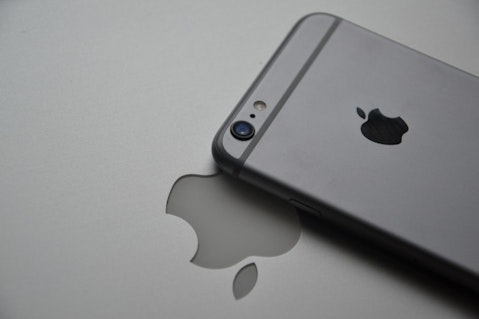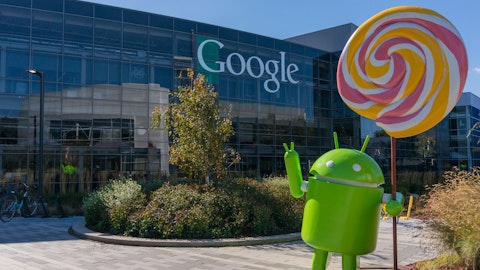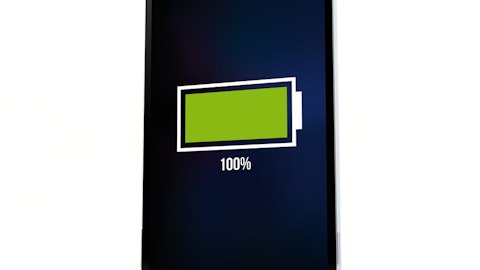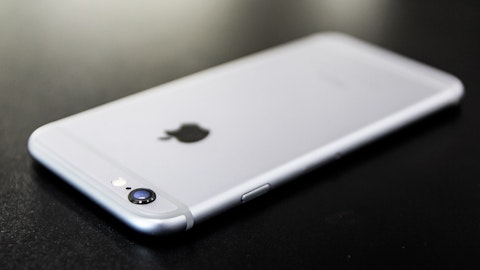It’s a mixed Friday for two of the biggest tech companies around. Apple Inc. (NASDAQ:AAPL)’s stock has inched up after the bell as the new generation of iPhones hit the stores today. The iPhone 6S and 6S Plus are now available worldwide, with analysts expecting record first-weekend sales. On the other hand, the rumors of a potential antitrust investigation have sent Google Inc (NASDAQ:GOOGL)’s stock into the red, with shares down by as much as 0.8%. The Mountain View-based giant is accused of blocking access to competitors’ services on its Android devices.

Analysts expect Apple to sell between 12 million and 13 million devices this weekend, up from the 10 million units that flew off the shelves a year ago. These estimates are based on strong pre-orders for the new smartphones, with Apple Inc. (NASDAQ:AAPL) having halted them due to excessive demand. People have started queuing up early in the morning, as is customary for each new iPhone launch, indicating that Apple is still benefiting from a strong brand loyalty. This is crucial given analysts concern about the company’s ability to maintain the pace of smartphone sales, which account for roughly two-thirds of its revenues. The iPhone 6S is available for $199 with a two-year service-provider contract, while the larger 6S Plus will cost an extra $100.
Follow Apple Inc. (NASDAQ:AAPL)
Follow Apple Inc. (NASDAQ:AAPL)
Receive real-time insider trading and news alerts
Although Apple Inc. (NASDAQ:AAPL) is the second most popular company among the hedge funds that we track, the number of fund holding a long position has decreased during the second quarter to 144, or 19.9% of the hedge funds, from 150 at the end of March. The overall value of their holding has also decreased by 1.1% to $21.2 billion and amassed less than 3% of Apple’s outstanding stock at the end of June. Nevertheless, legendary corporate rider Carl Icahn continues to be the biggest shareholder of Apple among the funds we track, with Icahn Capital reporting ownership of 52.7 million shares as of the end of the second quarter. Philippe Laffont’s Coatue Management has decided to boost its stake in the tech giant during the quarter, taking it to 8.54 million shares, while David Einhorn, a long time fan of Apple, has trimmed his position by 1%. His fund, Greenlight Capital has reported ownership of 7.38 million shares in its latest 13F filing.
At Insider Monkey, we track hedge funds’ moves in order to identify actionable patterns and profit from them. Our research has shown that hedge funds’ large-cap stock picks historically underperformed the S&P 500 Total Return Index by an average of seven basis points per month between 1999 and 2012. On the other hand, the 15 most popular small-cap stocks among hedge funds outperformed the S&P 500 Index by an average of 95 basis points per month (read the details here). Since the official launch of our small-cap strategy in August 2012, it has performed just as predicted, returning over 118% and beating the market by more than 60 percentage points. We believe the data is clear: investors will be better off by focusing on small-cap stocks utilizing hedge fund expertise (while avoiding their high fees at the same time) rather than large-cap stocks.
Apple has continued to increase its share buyback program during the second quarter, taking it to approximately $10 billion worth of stock, 18.2% higher compared to the first quarter of 2015. So far this year, the stock has not done brilliantly, yet it is still up by 4.5% and the current price of $115.34 per share gives the tech giant a market cap of $662 billion. At the beginning of September, analysts at Rosenblatt have initiated coverage on Apple’s stock, assigning a ‘Buy’ rating and a price target of $140 per share, while JMP Securities has reiterated its ‘Outperform’ rating and a price target of $160 per share.
Let’s move on to Google. The U.S. Department of Justice (DoJ) has teamed up with the Federal Trade Commission (FTC) to look into whether Google Inc (NASDAQ:GOOGL) has intentionally given priority to its own services, while restraining access to competitors’ services, according to Bloomberg. As most Android-based devices come with pre-installed Google apps such as Maps or YouTube, the DoJ and FTC will investigate whether this provided Google with an unfair advantage over its competitors. Pinar Ackman, professor of law at the University of Leeds, cited by CNBC, said that it would be very difficult to prove any wrongdoing, since the app market is very competitive and there are many ways users can install different apps on their devices. So far, Google has declined to comment on these reports. On Monday, JPM Securities reiterated its ‘Market Outperform’ rating on Google’s stock and a price target of $847 per Class A share. Atlantic Equities upgraded Google’s Class C stock to ‘Overweight’ from ‘Neutral’ in August and have assigned a price target of $825 per share.
Follow Alphabet Inc. (NASDAQ:GOOG)
Follow Alphabet Inc. (NASDAQ:GOOG)
Receive real-time insider trading and news alerts
Although Google is also one of the most popular stocks among the funds we follow, the number of long positions decreased during the second quarter to 115 funds owning Class A Google Inc (NASDAQ:GOOGL) shares and 107 funds holding Class C Google Inc (NASDAQ:GOOG) shares. The total value of the hedge funds’ investment in Class A shares has increased by 11% on the quarter to $8.19 billion, while the value of their stakes in Class C stock surged by 24% to $8.59 billion. Andreas Halvorsen is very bullish on Google, having increased his holding of Class A shares by 67% during the second quarter, while his holding of Class C stock rose by 37%. His fund, Viking Global, has reported ownership of 2.73 million Class A shares and 1.14 million Class C shares in its latest 13F filing. Ken Fisher is also betting on the stock, holding a stake that amasses 866,577 shares of Class A shares, up by 6% during the quarter, but its position in the Class C stock was reduced by 3% to 556,105 shares. Lee Ainslie, on the other hand, has reduced his investment in the tech giant by roughly 12% during the quarter, leaving his fund, Maverick Capital, with 621,569 Class C shares and at the end of June.
Disclosure: none.





